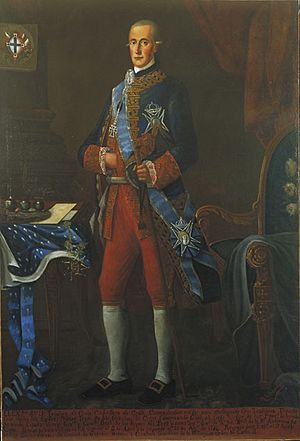Teodoro de Croix facts for kids
Quick facts for kids
Teodoro de Croix
|
|
|---|---|
 |
|
| 34th Viceroy of Peru | |
| In office April 29, 1784 – March 25, 1790 |
|
| Monarch | Charles III |
| Preceded by | Agustín de Jáuregui |
| Succeeded by | Francisco Gil de Taboada |
| Personal details | |
| Born | June 20, 1730 Prévoté Castle, near Lille, France |
| Died | 1792 Madrid |
Teodoro de Croix was an important Spanish soldier and leader who lived a long time ago. He was born on June 20, 1730, near Lille, France, and passed away in Madrid, Spain, in 1792. He served in two big areas controlled by Spain: New Spain (which is now Mexico) and Peru. From 1784 to 1790, he held the very important job of Viceroy of Peru.
Contents
Early Life and Military Career
Teodoro de Croix was born in France. He was the third son of a noble family. When he was 17, he joined the Spanish army. He was sent to Italy as a young officer.
In 1750, he joined the Walloon Guards. These were special bodyguards for the Spanish kings. He moved up in rank, becoming a lieutenant in 1756. He also became a knight in the Teutonic Order, a famous group of knights. By 1760, he was a colonel in the Walloon Guards.
Service in New Spain
In 1766, Teodoro de Croix traveled to New Spain. This area is now mostly Mexico. He worked as a captain in the guard of the Viceroy, Carlos Francisco de Croix.
Later, Teodoro became the leader of the fortress in Acapulco. He also checked on all the troops in the area. He did this job until 1770. In 1771, the Viceroy's time in office ended. Both Teodoro and Carlos returned to Spain.
Leading the Northern Provinces
In 1776, a new special area was created in New Spain. It was called the Commandancy General of the Internal Provinces of the North. This huge area included parts of what are now Texas, New Mexico, California, and other states.
This new area was created to deal with attacks from Native American tribes. It also helped protect against other European countries trying to take Spanish land. The main office for this new area was in Arizpe, Sonora.
Becoming Commandant General
On May 16, 1776, King Charles III of Spain chose Teodoro de Croix for a big job. He named him the first commandant general of this new northern region. Teodoro took over from the previous leader of Spanish forces.
He started his new job on January 1, 1777. He traveled from Mexico City to see the area he was in charge of. His main tasks were military defense and helping people settle the land. He also worked on converting Native Americans to Christianity.
Teodoro de Croix reported directly to the King's minister. He built the strongest military force ever seen on the northern border. This force stretched from Texas all the way to Sonora. He completely changed how the border was defended.
Viceroy of Peru
On February 13, 1783, Teodoro de Croix received an even bigger promotion. He was named Viceroy of Peru. This was one of the most powerful positions in the Spanish Empire. He handed over his command in the northern provinces to Felipe de Neve.
Changes in Peru
As Viceroy of Peru, Teodoro de Croix made many changes. He divided the government into seven smaller areas called intendencias. This helped to spread out power and make the government more efficient.
He also started building an anatomical amphitheater. This was a place for studying the human body. He also began the Botanical Garden of Lima, a place for studying plants. He worked to stop the spread of revolutionary ideas from the United States and France.
He made the coast stronger by improving its defenses. He also helped create new organizations for trade and mining in 1786.
Mapping and Return to Spain
During his time as Viceroy, he sent a naval officer named José de Moraleda y Montero to draw new maps. These maps were of the Chiloé Archipelago and nearby waters in northern Patagonia.
His time as Viceroy ended in 1790. After that, he returned to Spain. In 1791, he became a colonel in the king's bodyguard. He also became a commander in the Teutonic Order again. He passed away in Madrid the next year.
The people of Lima knew him as el Flamenco, which means "The Fleming."
Images for kids
See also
 In Spanish: Teodoro de Croix para niños
In Spanish: Teodoro de Croix para niños
 | Victor J. Glover |
 | Yvonne Cagle |
 | Jeanette Epps |
 | Bernard A. Harris Jr. |


